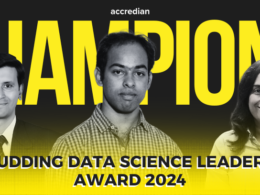Meet Richa Agnihotri, a determined data enthusiast from the April ’23 Cohort of E&ICT IIT-G Advanced Certification in Data Science and Machine Learning. With a previous background in a research sciences, Richa spent a majority of her time as a Research Associate at MS Swaminathan Research Foundation.
Seeking to enhance her work experience and explore the world of Data Science & ML, Richa enrolled in E&ICT IIT-G Advanced Certification in Data Science and Machine Learning.
Let’s dive into Richa’s journey and discover how Accredian helped her achieve her goals.
Question 1: Which program and batch are you part of at Accredian and tell us more about your current work profile.
Richa: I am a part of E&ICT IIT-G Advanced Certification in Data Science and Machine Learning from the April 2023 Cohort. I am working as postdoctoral researcher in agricultural microbiology.
Question 2: Walk us through your career journey & what got you interested in Data Science & Machine Learning.
Richa: After finishing school, I went on to complete my graduation and postgraduate studies in microbiology. My doctoral degree is in microbiology, with a specialization in agriculture.
During my Ph.D., I worked as a senior research fellow in the projects funded by Department of Science and Technology and Department of Biotechnology at ICAR-Indian Institute of Soybean Research, Indore, Madhya Pradesh.
After finishing my PhD, I moved on to postdoctoral research at M S Swaminathan Research Foundation, Puducherry, India. I have multiple research papers published in international journals in the fields of agricultural and environmental microbiology.
What fascinated me in the recent past was witnessing growing applications of data science, machine learning and other subfields of artificial intelligence in agriculture. These are applicable to my ongoing and forthcoming projects as well as manuscripts.
Question 3: What all tools and packages in Data Science & Machine Learning have you mastered in your current program at Accredian so far?
Richa: I have acquired expertise in many packages and tools used for data analysis. To work with numerical data for data analysis, manipulation, visualization, and graphical representation, some of the tools I would like to mention are Pandas, NumPy, Seaborn, and Matplotlib, which are open- source Python libraries.
A creative visualization of data allows for easy interpretation and future application of the resulting concept by both agriculturalists and scientists.
In addition, I have been able to interpret experimental outcomes and manage massive data sets with the help of supervised learning techniques including random forest, decision tree, data compression, and dimensionality reduction via principal component analysis.
Question 4: What are some of initial challenges when you got started on your Data Science journey and how did you overcome it?
Richa: There are numerous opportunities to integrate data science into the diverse field of agriculture. But my microbiology background and lack of coding knowledge made data science journey a little challenging for me.
To sum up, I was able to overcome the initial obstacles in my journey and advance in the field with the help of mentorship from Accredian, hands-on training, self-learning through pre and post learning modules and assignments.
The project also assisted me in putting my knowledge of agricultural datasets to arrive at conclusions on the most sustainable agricultural practices, cropping systems, soil types, and biofertilizer recommendations.
Question 5: In your view, what is the goal of Data Science?
Richa: Deriving beneficial insights and knowledge from extensive and complicated datasets is the fundamental aim of data science.
It involves exploiting data to derive significant insights, facilitate well-informed decision-making, and stimulate accurate results across a multitude of sectors, such as agriculture, finance, and healthcare.
Collecting, analyzing, and interpreting enormous amounts of information from a variety of sources can assist scientists and decision-makers in reaching conclusions and making well-informed choices are the functions of data science.
Question 6: How has Data Science evolved in last few years?
Richa: Both data science and AI have advanced greatly in the agricultural and environmental sectors in recent years. Precision agriculture, which optimizes planting, irrigation, and fertilization, is one important breakthrough.
Climate modeling which is a mathematical depiction of the key components of the climate system to understand climate patterns, predict extreme weather events, and assess the impact of climate change on agriculture and other ecosystems.
Crop Disease Monitoring analyses patterns and identifies and provides early indications of crop diseases. Remote sensing and satellite technology and the Internet of Things (IoT) which is utilized for real-time agricultural monitoring are some other important advancements.
Question 7: What are the current trends in Data Science that you are most excited about?
Richa: The Crop Monitoring technologies I mentioned before are the current developments that I am most enthused about. The most exciting areas for me are predictive modeling for climate resilience, disease and pest detection using machine learning, and genomic data analysis for improving crops.
AI integration in Decision Support Systems has the potential for transforming agriculture by delivering relevant knowledge and recommendations to researchers and, ultimately, farmers particularly in the face of changing climatic conditions.
Question 8: What is your advice to anyone wanting to start a career in Data Science?
Richa: Developing a data science career is a perpetual process of acquiring knowledge and making consistent advancements. Acquiring expertise in programming, statistics, and mathematics is not an absolute prerequisite for pursuing a career in data science.
Instead, see it as a process in which these skills may be developed progressively and consistently. As a biology background student interested in pursuing data science, adopting a strategic approach may lead to a rewarding career.
Direct your attention towards comprehending fundamental data science principles, and acquire practical knowledge by engaging in real-life projects.
We hope you enjoyed reading this interview. Check out the Accredian Spotlight for more interesting student stories like this.






